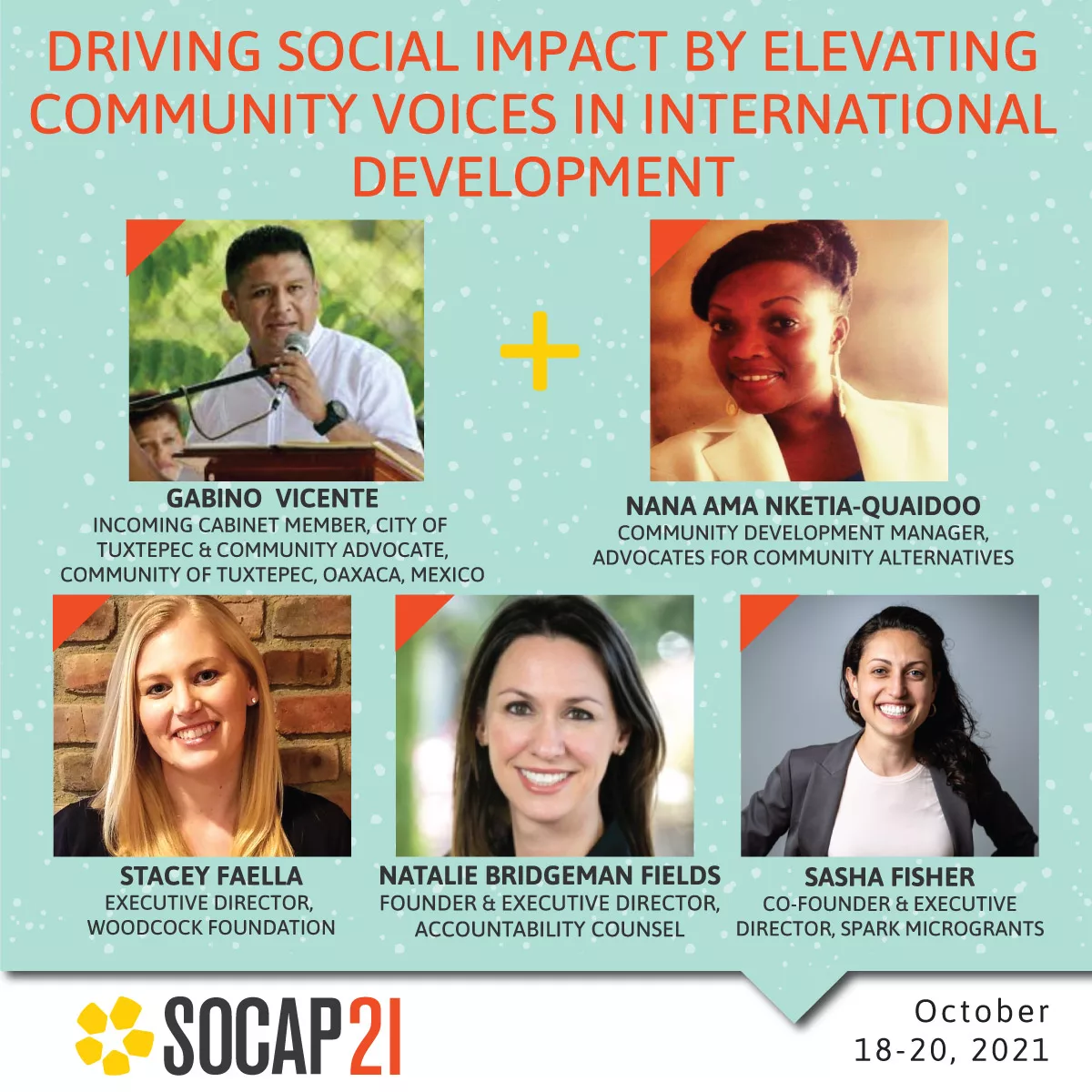Whether financed by NGOs, philanthropy, or impact investing, well-intentioned international development projects often miss the mark, and the unintended consequences of these projects risk harming the very communities they aim to support. The SOCAP21 session Driving Social Impact by Elevating Community Voices in International Development highlighted how centering community members in project design and decision-making processes can create sustainable development that maximizes social impact.
Moderator Stacey Faella of the Woodcock Foundation said because people in the community are most familiar with the issues that surround them, they are most suited to design solutions that will work and last. “Practice of community-driven development involves real listening and ensuring community participation,” she said. “At best it also centers community voices in leadership.”
Policies and processes often are in place to encourage community input on sustainable development, Faella said, but people are often not engaged early enough in the process to provide timely and valuable input. Examples of this were shared during the session by Gabino Vicente of the Community of Tuxtepec, Oaxaca, Mexico, where residents have worked with the Accountability Counsel since 2011 on community projects.
Vicente said that work began after a company wanting to build a hydroelectric plant came to the community but didn’t prioritize consulting with residents or take the time to understand local needs. When the project began, it threatened the community’s natural resources, such as water and trees.
He emphasized that the community members are not against investments or development. However, they want sustainable development projects that take into account their need to protect natural resources. The Accountability Counsel has helped Vicente and others create an accountability process and dialog platform for development projects.
Natalie Bridgeman Fields, founder and director of the Accountability Counsel, said the organization works with people in communities who typically are not consulted or involved in international development projects that affect their everyday lives — and impact investors and others backing these projects often learn after the fact that their capital has done more damage than good.
“On paper the investment looks great,” she said. “But if you peel back what’s under the paper and you look at real life, often there’s no consultation at all. We only work at the request of local communities. We’re really trying to flip the dynamic of communities having things imposed upon them because others think they know what they need.”
To help investors and others perform due diligence on sustainable development projects, the organization created the Accountability Console, a database of community complaints filed about the impacts of internationally financed projects.
Another community-informed concept for international sustainable development is microgrants provided through organizations like Spark Microgrants. Co-Founder and Executive Director Sasha Fisher said Spark Microgrants is initiating a community-driven methodology in partnership with governments in Rwanda and other nations in sub-Saharan Africa to shift from prescriptive to community-driven.
“We believe fundamentally that every village should have the right to determine their own positive future,” she said. “We’ve been developing a model called the facilitative collective action process that taps into indigenous organizing practices and creates a gender equity model within that.”
Through annual planning processes, communities receive grants that give them a say and ownership over local sustainable development projects and other changes. Spark Microgrants prioritizes equitable participation, Fisher said, so people of all genders and ages are part of the decision-making process.
Microgrants are an important tool to help people in west African communities shape a more sustainable future, said Nana Ama Nketia-Quaidoo of Advocates for Community Alternatives. The U.S.-based organization is working to provide legal support and advocacy strategies to communities that face human and environmental rights abuses from extractive industries.
“We make sure things start from the grassroots and move to the top,” she said. “If a community doesn’t understand the vision — where they want the development to go — at some point it divides them.”
Watch Driving Social Impact by Elevating Community Voices in International Development
Speakers:
Stacey Faella, Executive Director, Woodcock Foundation
Nana Ama Nketia-Quaidoo, Community Development Director, Advocates for Community Alternatives
Gabino Vicente, Community of Tuxtepec, Oaxaca, Mexico
Natalie Bridgeman Fields, Founder and Executive Director, Accountability Counsel
Sasha Fisher, Co-Founder and Executive Director, Spark Microgrants




